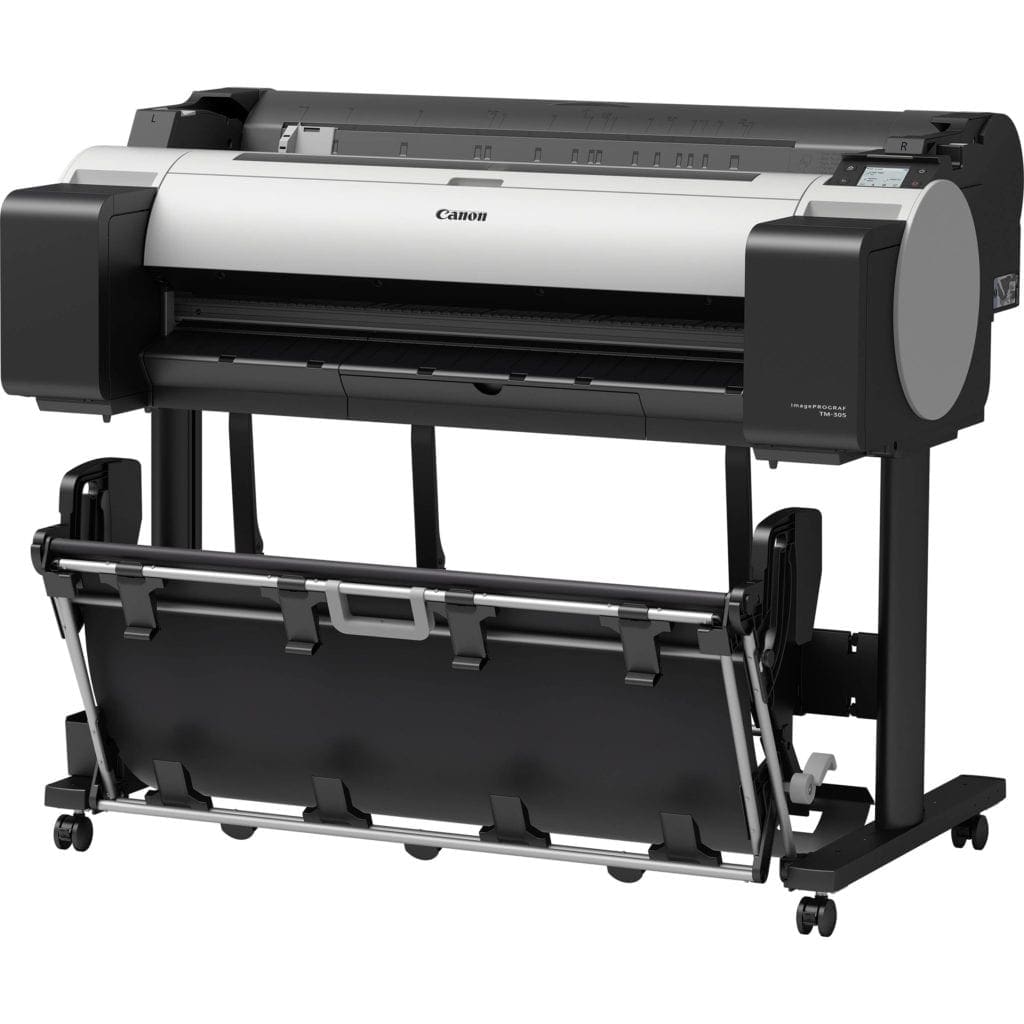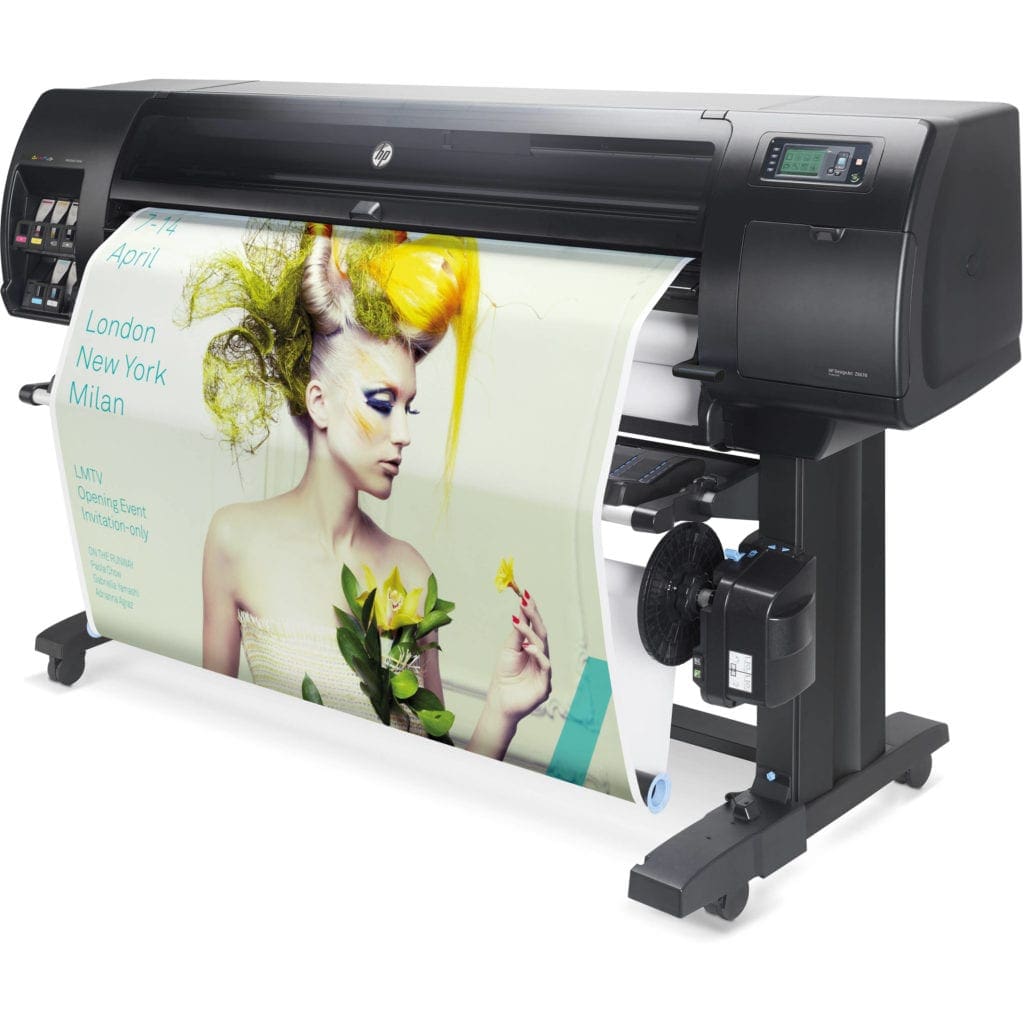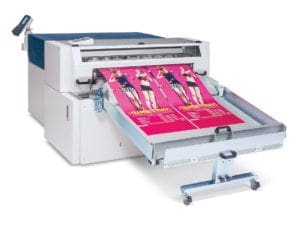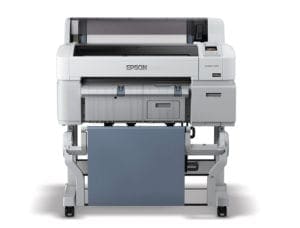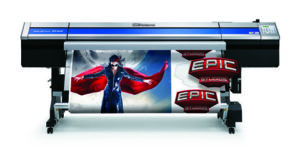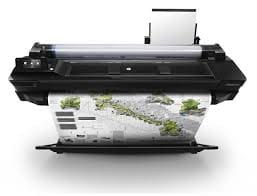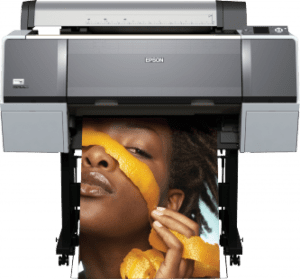How Much Do Wide Format Printers Cost in 2024?
Wide-format printers, also called large-format printers usually cost between $11,300 and $65,000. Standard sizes are roughly 22″, and can range to 60″ or larger. Calculate your cost, start here:
What are Wide Format Printers?
Wide-format printers are specialty printers that print on larger and heavier materials than the standard printers found in a typical office.
A wide format printer can save you time and money. However, it helps to understand pricing so that you can get the best deal.
You may find that you’re continuously going to the print shop for oversized print jobs. If so, it might make more sense to invest in a high-quality wide format printer.
Wide-format printers cost more than standard printers. However, they can save you significant costs over time.
With a wide format printer, you can print anything that’s more than two feet wide. For instance, you can make banners, blueprints, floorplans, signs, or even posters.
How Do Wide Format Printers Work?
Companies do great things with wide format printing. As an example, the Philadelphia Eagles used the wide-format medium as a way to keep fans involved in the game during the pandemic.
A wide format printer is also called a large format printer. There are two general kinds of wide-format printers.
First, there are toner printers that use heat to fuse dry toner to the paper. This kind of wide format printer is more expensive compared to the second alternative. However, it costs less to replenish toner-based printing supplies.
The second wide format printer alternative is an inkjet printer. This kind of printer fuses the ink to color paper.
An inkjet printer provides more resolution compared to a toner printer. It’s also capable of printing on many media other than paper.
When choosing a wide format printer, size is the most important consideration. Most wide format printers are 36-inch models.
However, they may vary give or take a few inches in either direction. The biggest wide format printers are wider than 60 inches. They’re called grand format printers.
In addition to choosing a printer size, you can also choose between a black and white or color wide format printer. Also, you can buy one with or without a scanner.
There’s a range of wide format printer features available. The features that you choose will depend on your needs.
Wide Format Printer Prices:
The price of wide-format printers varies based on the quality of the printer as well as the size. Prices also differ among manufacturers and printer type.
It’s also important to consider how long a wide format printer will last. For example, a printer that uses toner costs more upfront. However, it might last twice as long as an inkjet printer.
You may pay between $1,100 to $2,000 for a 24-inch-wide format inkjet printer. Meanwhile, a 36-inch-wide format inkjet printer might cost between $2,000 and $5,000. A wide-format UV flatbed printer might cost between $9,000 and $10,030.
An entry-level grand format printer that’s 60 inches wide may cost between $9,200 and $16,500. Alternatively, a top-of-the-line 60-inch Ricoh grand format printer might cost between $50,000 to $60,000.
Toner printers have a much wider price range. A smaller low-end wide format printer, for instance, might cost between $10,000 to $15,000. Alternatively, a larger, newer wide format printer may cost anywhere from $61,000 to $65,000.
You might want to save on your initial investment by purchasing a used wide format printer. If this sounds appealing, you might want to weigh the benefits of new and used printers.
Choosing the Right Wide Format Printer Features
Wide-format printers have many benefits and features. It’s a good idea to think about the features that you need before comparing printer costs. Some can sit on a desk or office table.
Most wide format printers are rather sizable. They can even weigh up to 1,000 pounds.
You may also see wide format printers that are as large as 7 feet by 5 feet in size. Typically, companies will dedicate an entire printing room for equipment of this stature.
Today’s modern wide format printers feature a touchscreen and powerful processor. Some have up to 64 GB of RAM and give you the ability to add more flash storage.
You may find a wide format printer with a resolution of up to 2888×1440 dots per square inch resolution. Most wide format printers use a combination of dye and pigment-based ink. This combination of inks creates vibrant pictures that last.
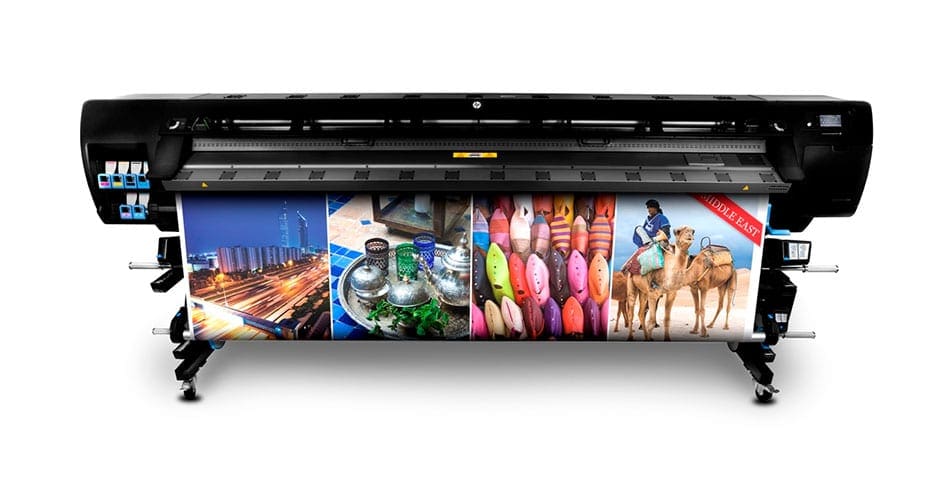

Most wide format printer ink is solvent- or water-based. Solvent-based inks are more cost-effective.
They also resist weather and fade better compared to water-based ink. As a result, solvent-based inks are more ideal for outdoor media.
Wide-format printers also print on a variety of materials. These materials might include standard, heavy bond, or photographic paper. Also, some wide format printers can print on unusual materials such as cloth, wood, and even glass.
What About Cost of Ownership?
As with most office equipment, the purchase price of a wide format printer is only the initial investment. Most of your ongoing operating costs will most likely lie in toner and ink for printers.
Typically, the cost of ownership is about the same for all printers. As you speak to printer suppliers, ask about the cost per page per square foot for their wide-format printers. This information can help you to develop a budget for printers that you might purchase.
You may also want to verify these costs. Accordingly, it’s a good idea to ask suppliers for customer referrals. They can tell you the true operating cost of a printer as well as provide you with information about the quality of a manufacturer’s equipment.
Finding the Equipment That You Need
Now that you know more about wide format printers, all you need is access to the best local suppliers.
Price It Here is a convenient place for you to fill out one form and have suppliers come to you. With our website, you can access highly competitive quotes that meet your needs quickly and easily.
At Price It Here, you can compare prices on the equipment and services you need with a few clicks. Whether you need a wide format printer, an office copier, or professional services, you can find it at Price It Here.
Compare Wide Format Printer Pricing
What to look for in Wide Format Printers?
When shopping for wide format printers, the total cost of ownership is something you should always look at. Inkjet models need their cartridges replaced or refilled, and toner models need toner replaced.
You need to look at the cost of these replacements, and how much printing a model can perform on a given cartridge or toner refill to understand the actual cost of ownership. Some manufacturers even publish statistics on how much it costs to actually print a given standard document, which makes it much easier to evaluate. Laser models typically cost less per-page than inkjet models, which can offset the larger initial price of purchase.
Speed is another very important consideration, especially if you’re in the business of producing large numbers of documents. Printers will list either how many sheets per minute, or how many square feet they can print in a given unit of time. Toner printers are typically faster than inkjet, but there is large variability in each type.
There are also a number of additional features that various manufacturers offer on these types of printers. None of these are universally “better” than the other. Instead, you should think about the specific applications that you plan to put the printer towards and then choose a feature set that will make your workflow as easy as possible. For some businesses, this might mean included scanning and copying features. These models may cost slightly more, but if you need that functionality anyway it is often easier to buy an integrated unit that incorporates all your needed features into a single machine.
Other machines have a built-in paper cutter which can make it very easy to quickly produce separate prints of a large run. Another is the ability to print on many different paper widths. These machines, especially those which can hold several widths simultaneously, are very useful in the commercial graphic printing industries where there is often a call to produce different sized products in a short amount of time.
